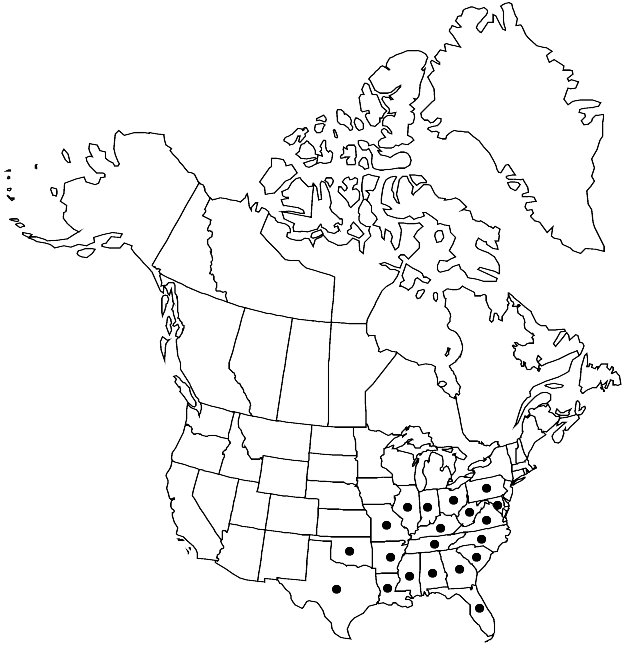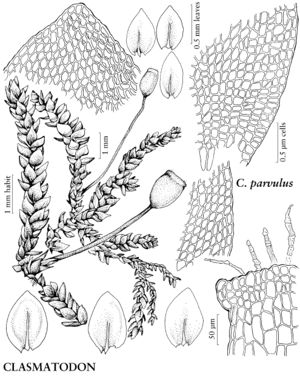Difference between revisions of "Clasmatodon parvulus"
in A. Gray, Manual ed. 2, 660. 1856.
FNA>Volume Importer |
imported>Volume Importer |
||
| (3 intermediate revisions by 2 users not shown) | |||
| Line 1: | Line 1: | ||
{{Treatment/ID | {{Treatment/ID | ||
|accepted_name=Clasmatodon parvulus | |accepted_name=Clasmatodon parvulus | ||
| − | |accepted_authority=(Hampe) Sullivant | + | |accepted_authority=(Hampe) Sullivant |
|publications={{Treatment/Publication | |publications={{Treatment/Publication | ||
|title=in A. Gray, Manual ed. | |title=in A. Gray, Manual ed. | ||
| Line 9: | Line 9: | ||
|special_status={{Treatment/ID/Special_status | |special_status={{Treatment/ID/Special_status | ||
|code=F | |code=F | ||
| − | |label= | + | |label=Illustrated |
}} | }} | ||
|basionyms={{Treatment/ID/Basionym | |basionyms={{Treatment/ID/Basionym | ||
|name=Leskea parvula | |name=Leskea parvula | ||
|authority=Hampe | |authority=Hampe | ||
| + | |rank=species | ||
|publication_title=Linnaea | |publication_title=Linnaea | ||
|publication_place=13: 46. 1839 | |publication_place=13: 46. 1839 | ||
| Line 20: | Line 21: | ||
|name=Clasmatodon parvulus var. rupestris | |name=Clasmatodon parvulus var. rupestris | ||
|authority=Lesquereux & James | |authority=Lesquereux & James | ||
| + | |rank=variety | ||
}} | }} | ||
|hierarchy=Brachytheciaceae;Clasmatodon;Clasmatodon parvulus | |hierarchy=Brachytheciaceae;Clasmatodon;Clasmatodon parvulus | ||
| Line 43: | Line 45: | ||
-->{{#Taxon: | -->{{#Taxon: | ||
name=Clasmatodon parvulus | name=Clasmatodon parvulus | ||
| − | + | |authority=(Hampe) Sullivant | |
| − | |authority=(Hampe) Sullivant | ||
|rank=species | |rank=species | ||
|parent rank=genus | |parent rank=genus | ||
| Line 56: | Line 57: | ||
|publication title=in A. Gray, Manual ed. | |publication title=in A. Gray, Manual ed. | ||
|publication year=1856 | |publication year=1856 | ||
| − | |special status= | + | |special status=Illustrated |
| − | |source xml=https:// | + | |source xml=https://bitbucket.org/aafc-mbb/fna-data-curation/src/2e0870ddd59836b60bcf96646a41e87ea5a5943a/coarse_grained_fna_xml/V28/V28_675.xml |
|genus=Clasmatodon | |genus=Clasmatodon | ||
|species=Clasmatodon parvulus | |species=Clasmatodon parvulus | ||
Latest revision as of 21:37, 5 November 2020
Plants slender, in interwoven mats. Stems to 1(–2) cm, branches to 2(–5) mm, erect; axillary hair distal cell obtuse, pale brown. Stem leaves ± subsecund, 0.3–0.5 mm wide; laminal cells 18–30 × 8–10 µm, smooth. Seta 0.2–0.5 cm. Capsule 0.7–1 mm; annulus 3- or 4-seriate, cells small, brown; exostome teeth blunt, partially connate; endostome basal membrane inconspicuous, segments 16, short, slender, unequally 2-fid, partially fused to basal membrane. Spores finely roughened.
Habitat: Tree trunks and bases, flood plain forests, calcareous rock
Elevation: low to moderate elevations (0-400 m)
Distribution

Ala., Ark., Fla., Ga., Ill., Ind., Ky., La., Md., Miss., Mo., N.C., Ohio, Okla., Pa., S.C., Tenn., Tex., Va., W.Va., Europe.
Discussion
The inconspicuous plants of Clasmatodon parvulus form small, slender, straggly mats on tree trunks in southeastern North America north of Mexico. The species is characterized by a short costa (Leskea species have a strong costa ending near the apex), ovate, mostly bluntly acute leaves (Lindbergia has long-acuminate leaves), and a lack of erect, flagelliform branchlets (as in Platygyrium repens). The elliptic, erect capsules with a reduced peristome on short setae also are diagnostic.
Selected References
None.
